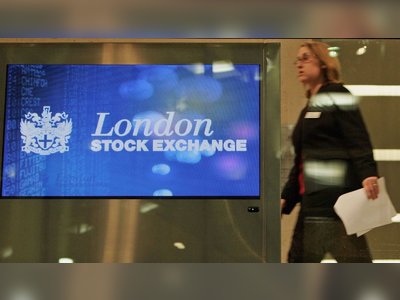
Fans could be banned until end of March
At a meeting on Tuesday, sports governing bodies - including those from football, rugby, cricket, Formula 1 and horse racing - were told to prepare for no spectators throughout the winter.
Officials from the Department for Culture, Media and Sport (DCMS) told the meeting, which was attended by Culture Secretary Oliver Dowden, that the ban on fans will be kept under review.
Premiership Rugby chief executive Darren Childs said: "The announcement that supporters will not be allowed into stadiums for up to six months cuts off crucial revenue for clubs who have already suffered significant financial losses from suspending the season and playing matches behind closed doors since March.
"We believe the lack of supporters in our grounds could cause irreparable damage to our clubs and the communities they serve, so we must find a way forward to avoid this."
Ralph Rimmer, the chief executive of the Rugby Football League, added: "Today's call specifically focused on the postponement of the pilot event programme and the plans for socially distanced crowds and the further serious impact this will now have on sports.
"The secretary of state indicated that the postponement may last throughout the winter. The impact on Rugby League and other sports is profound."
Earlier on Tuesday, Prime Minister Boris Johnson outlined a range of new restrictions for the country, including confirmation that plans to allow fans to return to sport from 1 October would not go ahead.
The plans had been placed under review earlier this month after a rise in coronavirus cases.
The UK's Covid-19 alert level has moved to 4, meaning transmission is "high or rising exponentially".
The prime minister also said restrictions are likely to remain in place for the next six months.
"We have to acknowledge the spread of the virus is now affecting our ability to reopen large sporting events," said the prime minister.
In an address to the Commons on Tuesday, Johnson announced new restrictions for the country and those included the halting of the phased return of fans.
"We will not be able to do this from 1 October and I recognise the implications for our sports clubs, which are the life and soul of our communities," he added.
"The chancellor and the culture secretary are working urgently on what we can do now to support them."
The pilot programme, which was to trial events of up to 1,000 spectators, has also been paused.
Two Premiership rugby union matches - Bath v Gloucester on Tuesday and Bristol v Leicester next week - will now be played behind closed doors, as will a horse racing meeting at Newmarket later this week.
The majority of sports in England have been played behind closed doors since the coronavirus lockdown in March, including Premier League football fixtures and the FA Cup final, England's Test cricket matches and two Formula 1 races at Silverstone.
Sport events that took place with full crowds in March shortly before all fixtures were postponed and the UK locked down have come under scrutiny.
The impact of Liverpool's Champions League fixture against Atletico Madrid on the spread of coronavirus is being investigated by the city's council, while there have also been calls for an investigation into whether horse racing's Cheltenham Festival should have gone ahead.
The government defended its decision to allow such events to proceed before restrictions on mass gatherings were introduced.
"People look back now at the beginning of the pandemic at some of the major sporting events then and ask the question why were they allowed to go ahead," said Cabinet Secretary Michael Gove on BBC Breakfast earlier on Tuesday.
"What we must do is look at sporting events now with caution but we also recognise that sport is a vital part of this nation and we're looking at everything we can do to support our athletes, our great clubs, through what will be a challenging time."
Julian Knight, the chair of the Digital, Culture, Media and Sport (DCMS) select committee, said: "If we don't find a route map with smart solutions to allow sports and live events to gradually reopen, we risk decimation of our sporting and cultural infrastructure."
The leaders of more than 100 sports bodies have written to the prime minister to ask for emergency funding, warning of "a lost generation of activity" because of coronavirus.
Sport England has handed out £200m for emergency cases, but many in the sector believe more is needed.
Earlier this month, Premier League chief executive Richard Masters told BBC Sport it was "absolutely critical" fans were allowed back inside stadiums as soon as possible and failure to do so would cost clubs £700m during the 2020-21 season.
English Football League (EFL) clubs lost £50m in gate receipts last season and estimate a £200m loss if there are no fans this season.
The Rugby Football Union (RFU), said no spectators at the forthcoming Autumn Nations Cup or Six Nations will result in losses of £60m.
Rugby Football League chief executive Ralph Rimmer urged the government not to delay the return of crowds, with clubs facing a potential impact on revenues of "up to £2m per week".
At the end of August, 2,500 people watched a friendly between Brighton and Chelsea at the Seagulls' Amex Stadium - the first time fans had been allowed into a Premier League ground for almost six months.
About 300 spectators were allowed to watch last month's World Snooker Championship final between Ronnie O'Sullivan and Kyren Wilson at the Crucible Theatre in Sheffield, but original plans to admit fans for all days of the tournament were reversed.
Arsenal's 9-1 victory over West Ham in the Women's Super League on 12 September saw up to 1,000 fans attend.
More than 2,500 spectators bought tickets for the first day of the St Leger meeting at Doncaster on 9 September, the first crowd at a British horse racing fixture in six months - but the rest of the meeting was then held behind closed doors.
Also on Tuesday, it was confirmed that indoor recreational team sports such as netball, basketball and five-a-side football will not be able to continue under the new restrictions, which limit numbers taking part to six.
Larger fitness classes will be permitted, as long as they are organised so those taking part do not mix in groups of more than six.
Elite indoor sports are exempt, as are indoor sports played by children.
Analysis
BBC sports editor Dan Roan
This is grim news for British sport, which teeters on the brink of an unprecedented crisis.
On one hand, it is no surprise, given rising cases of Covid-19, tighter restrictions and the criticism the government received for allowing events like the Cheltenham Festival to continue in March and not shutting down sooner.
The optics of allowing thousands of fans to travel to grounds while encouraging people to work from home was also seen as insurmountable.
But it will infuriate sports governing bodies that insist it is much safer for fans to be in highly regulated, socially distanced, often open-air venues and stadiums than watching on the TV in pubs, for instance.
They are not aware of any data or research which proves the return of fans would increase transmission. And they point to the fact that countries like Germany are allowing thousands of fans back inside grounds.
Sports are now being warned to brace themselves for several months without fans and report back to DCMS officials what impact this will have on their finances.
For EFL and rugby clubs in particular, where matchday revenue is crucial, the answer will be potentially devastating. From non-league football and Olympic sports, through to grassroots clubs and community leisure facilities, the sector fears an existential crisis which could cost thousands of jobs and result in a slump in participation.
Pressure will now build on the government to come up with a similar emergency fund to the £1.57bn bailout the arts sector was handed in the summer. Calls for the Premier League to help prop up the football pyramid will also intensify.











